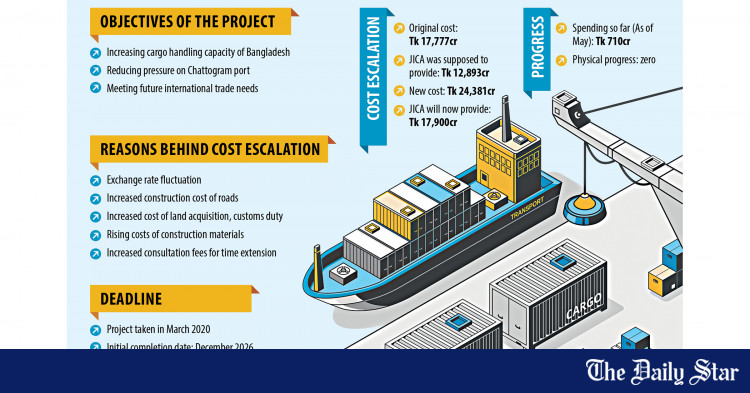Our Terms & Conditions | Our Privacy Policy
Why the cost of Matarbari deep-sea port project is going up
Four years after its approval, the cost of the Matarbari deep-sea port project in Cox’s Bazar has escalated, while the deadline has been pushed back too.
Although the real physical progress on the project is still zero, authorities say five major factors have contributed to the project registering a 37 percent cost increase.
For all latest news, follow The Daily Star’s Google News channel.
These factors include depreciation of the taka, additional land acquisition expenses and design changes, according to official documents submitted to the Executive Committee of the National Economic Council (Ecnec) meeting on Monday.
After the Ecnec revision, the project’s total cost now stands at Tk 24,381 crore — Tk 6,604 crore more than the initial cost of Tk 17,777 crore.
When the project, namely “Matarbari Port Development,” was taken in March 2020, it was supposed to be completed by 2026. It has now been pushed back to December 2029.
As of May this year, the authorities spent Tk 710 crore. However, the real progress is still zero as the main construction work of the project has not started yet, according to official documents.
The project was taken up to increase the cargo handling capacity of the country, reduce the pressure on Chattogram port and meet the future international trade needs.
The concept of a deep-sea port in Matarbari emerged in conjunction with the government’s coal-based power plant project in the area. The power plant required a wider channel and a port to receive fuel imports.
Of the five factors contributing to the cost increase, the project authorities have cited the fluctuation of the foreign currency exchange rate as the primary driver.
Although the real physical progress on the project is still zero, authorities say five major factors have contributed to the project registering a 37 percent cost increase
When the project was taken up in 2020, the US dollar exchange rate was around Tk 84, but it has now reached Tk 119.
Besides, the authorities have mentioned the increased spending for revenue payments, such as customs duty and value-added tax (VAT), as well as higher costs for land acquisition.
Thirdly, the authorities have allocated an additional Tk 675 crore due to changes in the detailed design, officially categorised as a “change of work scope”.
As per the project documents, the length of roads and highways for the port will be 16.53 kilometres, which was 27.51km in the initial plan. In the revised plan, the length of bridges has been extended to 10km from the previous 7km.
These, all together, have caused the cost escalation for the “change of work scope”.
Fourthly, the rate schedule of the construction work has been changed as prices of construction materials have increased over the years.
Lastly, the project authorities estimate that consultation expenses will rise further due to the three-year extension.
“Not a single penny will be spent unnecessarily”
At a press briefing after the Ecnec meeting, Planning Adviser Prof Wahiduddin Mahmud said although the main project is the construction of the deep-sea port, a large chunk of money will be spent on the construction of the approach road and bridge.
In response to questions about the costs of roads and bridges, the adviser said that no “unnecessary” or “extra money” would be spent.
The adviser said the Ecnec approval is not the final step, as the Implementation Monitoring and Evaluation Division (IMED) and relevant ministries will continue to assess project development regularly.
“Our development partners have also agreed that they will cooperate with us so that no irregularities take place during implementation,” he said.
“We can’t say what the next government will do. We want to make some rules in this regard,” he added.
A planning ministry official said they have to seek consent from the government to review the existing projects. In particular, they got directives to move on with the foreign-funded projects.
At the press briefing, Prof Mahmud said, “We badly need a deep-sea port in Bangladesh as other ports, including Chattogram and Payra, do not have enough capacity to handle the excessive pressure of the future trades.”
In the absence of a deep-sea port, the country’s business transportation turns costlier thanks to loading and unloading containers on mother vessels at Singapore or Colombo port.
“It’s also a time-consuming issue,” he said.
“There was a lot of tension about whether China or India would do this project. Nothing was really happening for geopolitical reasons.”
Finally, the government has selected Japan as the development partner, which charges lower interest and offers a longer repayment period, Mahmud said.
Besides, Japan usually completes projects timely, which they demonstrated in previous metro rail and the third terminal of Dhaka airport projects, he said.
“We never heard of any Japanese company involved in project corruption,” he said.
“For this reason, Japan has been picked up for the project,” he said.
Images are for reference only.Images and contents gathered automatic from google or 3rd party sources.All rights on the images and contents are with their legal original owners.



Comments are closed.